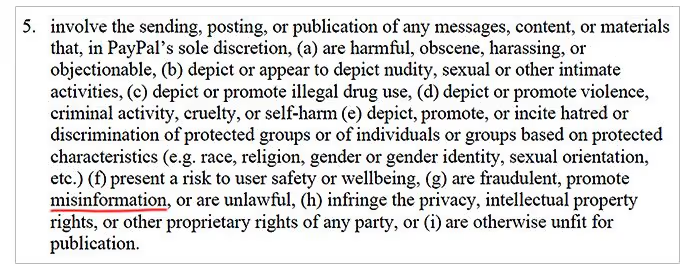PayPal announced a new regulation on October 8, 2022, that prompted a storm of protest over the prospect of imposing a $2,500 penalty per occurrence on any of its 429 million customers and merchants if they stated what the company thinks is misinformation starting November 3 causing masses to boycott PayPal.

Paypal's new policy
PayPal instituted a new policy that fines users $2500 for any false or inaccurate information they provide to crack down on the spread of misinformation. The policy was announced Saturday, October 8, 2022. PayPal immediately backtracked after users complained.
"PayPal is not fining people for misinformation, and this language was never intended to be inserted in our policy." said a PayPal spokesperson. "Our teams are working to correct our policy pages. We're sorry for the confusion this has caused."
PayPal announced a new policy that would go into effect November 3, which included penalizing anyone who sends, posts, or promotes misinformation that could harm users. Mediaite reported that those violating would automatically see a $2,500 fine removed from their PayPal account.
How It Backfired
PayPal has come under fire for levying a $2500 fine in their new Acceptable Use Policy that was shared over the weekend. They've since updated the policy, but not before the internet caught wind and PayPal trended on Twitter with many people vowing to boycott the company.
Many PayPal users were outraged by the new policy, which would have fined anyone who sent, posted, or promoted misinformation that could harm Paypal's community. The $2,500 fine would automatically be taken from the PayPal account of anyone in violation.
After the internet caught wind of the new policy, PayPal trended on Twitter, with many people vowing to boycott the company. PayPal has since updated the policy and apologized for the new Acceptable Use Policy stating that the policy was published in error.
Following the publication of PayPal's new acceptable use policy (AUP) on Saturday, the term "BoycottPayPal" was prevalent on Twitter. On Monday morning, Google searches for "how to cancel PayPal" and "cancel PayPal account" were trending, as well as "delete a PayPal account" and "how do I remove a PayPal account."
As a result of the misinformation policy backlash, PayPal stock is down almost 6% midday on Monday. In the wake of the recent incident, PayPal has issued a statement saying that it will no longer fine users for providing misinformation. The company says it made a mistake in this instance and is committed to making things suitable for its customers.
PayPal also says it will review its policies and procedures to prevent something like this from happening again.
The Public Reaction
The public reaction to PayPal's new policy of fining users for misinformation was swift and harsh. Many individuals took to social media to express their displeasure, some even threatening to leave the site entirely.
PayPal backed down almost immediately, issuing a statement that claimed the policy was never intended to be applied in such a narrow manner. The firm apologized for any misunderstanding and said it would make future changes more transparent.
Elon Musk, a PayPal cofounder and a free-speech supporter, was appalled by the decision. He publicly criticized Paypal's method of control.
While PayPal has since reversed its policy on fining users for misinformation, the damage may already be done. The company's stock is down, and many individuals threaten to leave the site. Only time will tell if PayPal can recover from this public relations disaster.
Conclusion
PayPal's decision to fine users for sharing misinformation is a step in the right direction, but the company needs to do more to combat false information on its platform. Backtracking immediately after announcing the policy shows that PayPal is not yet ready to commit to this course of action. We urge the company to continue working on this issue so that all can use its platform safely and responsibly.
The PayPal episode left many customers feeling frustrated and alienated. The company will take some time to improve its image as a user-friendly platform.















